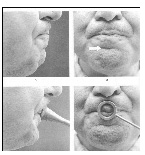The Young Brass Players' Embouchure FAQ
Injury Prevention, High Range Development, and
Mouthpiece Pressure
This Web site is largely about the embouchure
problems and lip injuries developed by professional players. However, I
frequently get inquiries from young players on how they can recognize or
avoid a lip injury or how they can address certain playing problems they
would like to improve.
Impatience is the greatest enemy of
success. Young players want sparkling technique and a powerful, secure
high range but rarely realize that there are no gimmicks, special
exercises, or shortcuts which will get them the high C of their dreams
as quickly as they would like. Unfortunately, sometimes desire and
impatience can collide and become a dangerous combination.
Even
for the most talented players, great technique and a secure high range
take years to achieve and require considerable physical and mental
development. So, the student or young professional who decides one day
that he is going to master his high range, learn a very demanding
concerto, or perfect every piece on the repertoire list of an upcoming
audition can wind up putting himself and his embouchure at great risk.
Injury Prevention for the Young Player
Most young players naively believe, "...If I practice 5 hours a day, realllllly hard, I'll get monster chops."
Monster chops are developed not by how many hours you practice but how you practice. A half hour of focused, thoughtful practice is far more productive than two hours of mindless chop banging.
How can a young player know when he's played too much? The best warning signal is lip discomfort. When you've played to the point where your lips have become sore or puffy, that's the time to stop playing. If the lips are still swollen and sore the next day, consider taking a day off. Playing on swollen lips will only render very frustrating results for even the best player. It's better to lose a day of practice and let a damaged lip heal than to think you will "lose" your chops by not practicing.
"My high range is not very good. When I get to a certain point I know that I use too much mouthpiece pressure."
If your high range is not strong, you might want to check your chin when you play. Usually, a problem with the high range is caused by what French hornist Phil Farkas referred to as the "bunching" chin, as you can see demonstrated in the top photograph on the right. If the center of your chin isn't "stretching" downward in the high range, as demonstrated in the bottom picture on the right, your high notes will be strained, and you will compensate for that by using greater mouthpiece pressure.
Watch yourself in a mirror, and play an ascending scale up to high C [instrument pitch]. The center of your chin should appear flat or feel like it is "stretching" downward, not pushing or bunching up toward your lower lip. The natural tendency for younger players is to try to assist playing high notes by pushing the center of their chins up.
You can try a little experiment by playing a comfortable high note and, as you play, stretch the center of your chin down very gently with the index finger of a free hand, and then intentionally squeeze the center of your chin upward. You should hear and feel a noticeable difference in the sound. A downward-stretching chin will give you a clearer, more focused sound.
Young players, who have not yet learned to keep their chins down, will have to work to train it to perform correctly in playing. To do that is very, very difficult and frustrating and will take months of practicing in front of a mirror for a player to be able to control his chin in the high range. Having said that, student players should speak with their teachers before engaging in any kind of mechanical adjustment of their embouchures. If your chin is working properly and you're still having trouble in the high range, the cup of your mouthpiece might be too deep, the bore of your mouthpiece might be too big, or there may be a better rim or inner mouthpiece diameter which could help solve your problems. 99% of the time, though, a problem high range is attributable to a faulty use of the chin.
"How can I get a better high range and tone without causing damage or using too much pressure?"
Muscles which fuel playing techniques and mechanics can't develop overnight. Concentrated daily practice will render steady results. It takes many weeks of focused practice to conquer a new playing technique and physical maturity is essential for developing high range control. Therefore, a "professional quality" high range comes about with age.
Mouthpiece Pressure
Mouthpiece pressure, by itself, is not a problem. Strong, coordinated playing mechanics will always counterbalance mouthpiece pressure. However, when a player's mechanics are not developed, and most young players do not have well-developed mechanics, or one's mechanics have been injured from overuse, mouthpiece pressure can be a problem. I advise students not to worry about their mouthpiece pressure and just focus on developing good embouchure mechanics. If they do that, any mouthpiece pressure they have been experiencing will eventually disappear."I noticed that I have a permanent sort of white "ring" on my upper lip where the mouthpiece hits. Is that a sign of lip damage?"
Lip damage is signaled by pain and swelling. It rarely has any outward appearance.


Connect With Us